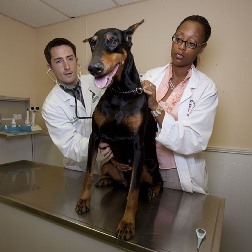How to Enroll In a Veterinary Assistant School near Litchfield Connecticut
 Fulfilling your lifelong aspiration of working with and helping animals by enrolling in a vet college near Litchfield CT may initially seem like an overwhelming endeavor. After all, you need to locate and enroll in a college that will furnish the appropriate training to ensure that you can be successful as a veterinary assistant, technician or technologist. But just how do you approach evaluating and contrasting colleges so that you can make the best choice? Many potential students start their due diligence process by looking for colleges that are near their residences. Once they have identified some area schools, they determine which ones have the lowest tuition and hone in on those. Although expense and location are important considerations when comparing vet tech schools, they are by no means the only important ones when making your evaluations. Qualifications such as internship programs and accreditation should be evaluated also. The point is that there are questions you ought to be asking the veterinary tech programs you are evaluating before you make a final selection. We have provided several in this article in order to help get you started, but before we discuss them we’ll explore the varied roles of veterinary techs and assistants and the training options offered.
Fulfilling your lifelong aspiration of working with and helping animals by enrolling in a vet college near Litchfield CT may initially seem like an overwhelming endeavor. After all, you need to locate and enroll in a college that will furnish the appropriate training to ensure that you can be successful as a veterinary assistant, technician or technologist. But just how do you approach evaluating and contrasting colleges so that you can make the best choice? Many potential students start their due diligence process by looking for colleges that are near their residences. Once they have identified some area schools, they determine which ones have the lowest tuition and hone in on those. Although expense and location are important considerations when comparing vet tech schools, they are by no means the only important ones when making your evaluations. Qualifications such as internship programs and accreditation should be evaluated also. The point is that there are questions you ought to be asking the veterinary tech programs you are evaluating before you make a final selection. We have provided several in this article in order to help get you started, but before we discuss them we’ll explore the varied roles of veterinary techs and assistants and the training options offered.
The Role of a Veterinary Technician and Assistant
 One of the initial decisions that you will need to make is whether you plan to train as a veterinary technician, assistant or technologist. Part of your preference might be predicated on the amount of time and money that you have to commit to your training, but the principal factor will undoubtedly be which specialty appeals to you the most. What vet techs and assistants have in common is that they both work under the immediate supervision of a licensed and practicing veterinarian. And although there are many duties that they can perform within the Litchfield CT veterinary clinic or hospital, they can’t prescribe medications, diagnose health issues, or conduct surgeries. In those areas they may only provide support to a licensed vet. There are technologists and technicians that work away from the typical vet practice, such as for zoos, animal shelters or police departments. Let’s take a look at the job functions and training prerequisites for each position.
One of the initial decisions that you will need to make is whether you plan to train as a veterinary technician, assistant or technologist. Part of your preference might be predicated on the amount of time and money that you have to commit to your training, but the principal factor will undoubtedly be which specialty appeals to you the most. What vet techs and assistants have in common is that they both work under the immediate supervision of a licensed and practicing veterinarian. And although there are many duties that they can perform within the Litchfield CT veterinary clinic or hospital, they can’t prescribe medications, diagnose health issues, or conduct surgeries. In those areas they may only provide support to a licensed vet. There are technologists and technicians that work away from the typical vet practice, such as for zoos, animal shelters or police departments. Let’s take a look at the job functions and training prerequisites for each position.
- Vet Assistants in the majority of cases will have completed a formal training program, either as an intern or apprentice in a practice, or by finishing a certificate program at a community college or vocational school near Litchfield CT. As the name implies, their job function is to assist the vets and vet technicians in the completion of their duties. Usually they are not involved with more involved tasks, such as assisting with surgical procedures. Some of their typical responsibilities may include working at the front desk, cleaning and preparing exam rooms and equipment, or controlling pets during exams.
- Vet Technicians receive more extensive training in contrast to assistants and generally earn a two year Associate Degree, preferably from an American Veterinary Medical Association (AVMA) accredited program. They are in a fashion the veterinarian counterparts of medical nurses, since their general job duty is to assist vets with diagnosing and treating animal patients. Where they differ from veterinary assistants is that they are included in more involved duties, such as assisting with surgeries or administering medicine. All states presently require vet techs pass a credentialing examination for either licensing, registration or certification.
- Vet Technologists are comparable to veterinary techs and essentially carry out the same job functions. They are mandated to attain a Bachelor’s Degree in veterinary technology, which typically requires four years. Therefore the main distinction between a vet technician and a technologist is the technologist’s more advanced level of education. But with an advanced degree comes more career options, increased salaries and possible management positions. They are additionally required to pass a credentialing examination for either registration, certification or licensing.
Vet techs and technologists can specialize in areas such as anesthesia, internal medicine or emergency care. Some may earn certification from the American Association for Laboratory Animal Science (AALAS) to work in laboratories or Litchfield CT area research facilities as well.
Veterinary Online Courses
 An option that might make sense for those with a hectic lifestyle or who are working full time while attending vet school is to enroll in an online training program. Since the classes are provided by means of the internet, students can study on their own schedule wherever a computer is available. The educational program is taught using various venues, including videos, slide shows and live streaming webinars. And since many vet tech and technologist degrees require clinical training, that part can typically be completed as an internship or work study program at a local Litchfield CT veterinary practice or hospital. Distance learning, as it is also called, may in some instances lower the cost of your education. Tuition and ancillary expenditures, for example for commuting and study materials, can be cheaper compared to more standard classroom programs. Just be sure that the online school that you enroll in is accredited, either by the AVMA or another nationally recognized accrediting agency. With the online classes and the clinical training, everything is provided for a complete education. So if you are disciplined enough to learn in this more independent mode, an online vet tech or assistant school may be the ideal choice for you.
An option that might make sense for those with a hectic lifestyle or who are working full time while attending vet school is to enroll in an online training program. Since the classes are provided by means of the internet, students can study on their own schedule wherever a computer is available. The educational program is taught using various venues, including videos, slide shows and live streaming webinars. And since many vet tech and technologist degrees require clinical training, that part can typically be completed as an internship or work study program at a local Litchfield CT veterinary practice or hospital. Distance learning, as it is also called, may in some instances lower the cost of your education. Tuition and ancillary expenditures, for example for commuting and study materials, can be cheaper compared to more standard classroom programs. Just be sure that the online school that you enroll in is accredited, either by the AVMA or another nationally recognized accrediting agency. With the online classes and the clinical training, everything is provided for a complete education. So if you are disciplined enough to learn in this more independent mode, an online vet tech or assistant school may be the ideal choice for you.
What to Ask Vet Assistant and Technologist Degree Programs
 By now you probably have selected which veterinarian certificate or degree that you would like to earn, and if you prefer to study online or attend a school on campus. Since there are a large number of veterinarian community colleges, technical and vocational schools in Connecticut as well as across the Country, you must ask some qualifying questions to help fine tune your list of alternatives. As we discussed in our opening, many future students start by concentrating on location and tuition expense. But we have already pointed out other important qualifiers, such as accreditation and internship programs. And naturally you need to choose a college that offers the degree and specialty that you are interested in. These and other factors are reviewed in the list of questions that you should ask the Litchfield CT veterinary assistant and tech programs that you are considering.
By now you probably have selected which veterinarian certificate or degree that you would like to earn, and if you prefer to study online or attend a school on campus. Since there are a large number of veterinarian community colleges, technical and vocational schools in Connecticut as well as across the Country, you must ask some qualifying questions to help fine tune your list of alternatives. As we discussed in our opening, many future students start by concentrating on location and tuition expense. But we have already pointed out other important qualifiers, such as accreditation and internship programs. And naturally you need to choose a college that offers the degree and specialty that you are interested in. These and other factors are reviewed in the list of questions that you should ask the Litchfield CT veterinary assistant and tech programs that you are considering.
Is the Vet School Accredited? It’s important that you make sure that the vet assistant or technician school you choose is accredited by a regional or national accrediting agency. As previously discussed, among the most highly regarded is the American Veterinary Medical Association (AVMA). Vocational schools and colleges that are accredited by the AVMA have undergone a rigorous screening process that verifies you will receive a superior education. Also, accreditation is necessary if you are requesting a student loan or financial aid, since many programs are not obtainable for non-accredited colleges. Last, having a degree or certificate from an accredited school is in many cases a prerequisite for employment for many Litchfield CT vet clinics and hospitals.
What is the College’s Reputation? The veterinary trade school or college and program you select must have an excellent reputation within the veterinary field. You can initiate your due diligence by asking the colleges you are interested in for endorsements from the employers in their job placement network. Other suggestions include checking with internet school ranking websites and contacting the school’s accrediting agencies as well. You can ask the Connecticut school licensing department if there have been any complaints or infractions involving your targeted schools. As a final suggestion, call some Litchfield CT veterinarians that you might wish to work for after you get your training. Ask what they think of your school selections. They might even recommend some colleges not on your list.
Are there Internship Programs? The best approach to obtain practical hands on training as a vet assistant or technician is to work in a clinical environment. Ask if the colleges you are reviewing have internship programs arranged with regional veterinarians, vet hospitals or practices. Most veterinary medicine programs require clinical training and many furnish it by way of internships. Not only will the experience be invaluable regarding the clinical training, but an internship may also help build connections in the local Litchfield CT veterinarian community and aid in the search for employment after graduation.
Is Job Placement Offered? Searching for a job after graduating from a vet tech or assistant college may be challenging without the assistance of a job placement program. To start with, ask what the graduation rates are for the colleges you are considering. A lower rate could signify that the teachers were unqualified to teach the curriculum or that a number of students were disappointed with the program and quit. Next, confirm that the schools have a job placement program and ask what their placement rates are. A higher placement rate might indicate that the Litchfield CT school has an excellent reputation within the vet community and has a significant network of contacts for student placements. A low rate may indicate that the training is not highly thought of by employers or that the job assistance program is ineffective at placing students.
How Large are the Classes? If the classes are bigger, you probably will get little or no one-on-one instruction from the teachers. Solicit from the Litchfield CT schools you are considering what their classroom student to teacher ratios are. You may also decide to participate in a few classes (if practical) to monitor the interaction between instructors and students. Ask for feedback from students regarding the quality of instruction. Also, speak with the teachers and determine what their qualifications are as well as their methods of teaching.
Where is the College Located? Okay, we already covered location, but there are a couple of more points to consider on the topic. If you are going to drive to your vet tech classes from home or work, you have to confirm that the commuting time is compatible with your schedule. For instance, driving during the weekend to investigate the route won’t be the same as the commute during rush hour traffic, especially if the Litchfield CT college is located near or in a large city. Also, if you do opt to attend a school in another state or even outside of your County of residence, there may be higher tuition charges particularly for community and state colleges. On the other hand, taking online classes could be an alternative that will give you more flexibility and minimize the necessity for travel.
Do the Classes Fit Your Schedule? And last, it’s essential that you determine if the Connecticut veterinarian programs you are evaluating offer class times flexible enough to accommodate your schedule. For example, many students continue working full time and can only go to classes on the weekends or in the evenings. Others might only be able to go to classes in the morning or in the afternoon. Make sure that the class times you need are offered near Litchfield CT prior to enrolling. Also, determine if you can make-up classes that you might miss as a result of work, sickness or family responsibilities. You may discover that an online college is the best way to fit your veterinary training into your hectic life.
Why Did You Choose to Become a Vet Tech?
When preparing to interview for a veterinary position, it's helpful to review questions you could be asked. Among the questions that recruiters typically ask veterinary applicants is "What compelled you to select veterinary care as a profession?". What the interviewer is trying to discover is not just the personal reasons you might have for becoming a vet tech, but also what qualities and abilities you have that make you outstanding at what you do. You will undoubtedly be asked questions pertaining primarily to veterinary care, as well as a certain number of standard interview questions, so you should prepare several strategies about how you want to address them. Considering there are several factors that go into choosing a career, you can answer this primary question in a variety of ways. When formulating an answer, try to include the reasons the profession appeals to you as well as the strengths you possess that make you an exceptional vet tech and the best choice for the job. Don't try to memorize a response, but write down a few concepts and anecdotes that relate to your own strengths and experiences. Reading through sample answers can help you to prepare your own thoughts, and give you ideas of what to include to impress the interviewer.Pick the Ideal Vet Tech Degree Program near Litchfield CT
Selecting the right vet assistant or tech program is a critical first step to starting a rewarding career providing treatment and care for animals. Future students considering vet assistant or tech schools need to make their decision based on several key issues. Veterinary techs, assistants and technologists work in veterinary clinics and hospitals and animal shelters. They typically take on administrative responsibilities and assist the veterinarian with the animal patients as needed. As we have discussed, it’s essential that you enroll in a veterinary medicine program that is both accredited and has an outstanding reputation within the profession. This applies to online vet tech schools as well. By asking the questions included in our checklist for reviewing schools, you will be able to narrow down your alternatives so that you can make your final selection. And by selecting the ideal school, you can achieve your goal of becoming a vet technician, assistant or technologist in Litchfield CT.
A Little Bit About Litchfield CT
Litchfield, Connecticut
Litchfield is a town in and former county seat of Litchfield County, Connecticut, United States.[4] The population was 8,466 at the 2010 census. The boroughs of Bantam and Litchfield are located within the town. There are also three unincorporated villages: East Litchfield, Milton, and Northfield.
Located southwest of Torrington, Litchfield also includes part of Bantam Lake. According to the United States Census Bureau, the town has a total area of 56.8 square miles (147.1 km²), of which, 56.1 square miles (145.2 km²) of it is land and 0.7 square miles (1.9 km²) of it (1.3%) is water.
Litchfield is about 95 mi (153 km) from Central Park in New York, about 50 mi (80 km) from the Hudson River valley, and about 40 mi (64 km) from the nearest sea coast, on Long Island Sound.
More Cities of Interest in Connecticut
